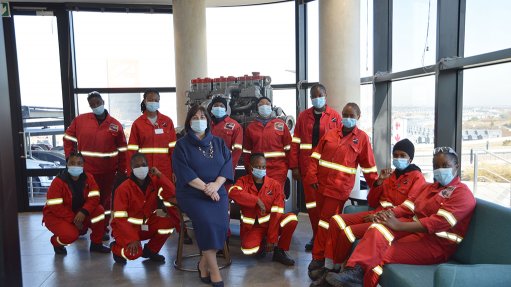
TALENT PIPELINE The company’s apprenticeship programme accepts a higher ratio of young women from technical colleges into the three-year programme
Power technology provider Cummins invests in many corporate responsibility initiatives (CRI) to assist in increasing access to technical careers for young girls from school level onwards.
These initiatives focus on equitable access to education, economic empowerment, legal rights and safety.
Cummins business project manager Simi Vallabh states that these initiatives
include providing girls with more options from which to choose careers and entrepreneurship training for economic empowerment.
“Through the Cummins Powers Women Programme, we identify successful community partners with a proven success record that we can partner with to help young girls successfully complete their secondary schooling. We also encourage more young girls to pursue technical education through the Cummins Technical Education for Communities (TEC) programme.”
She adds that through these programmes, Cummins intentionally accepts a higher ratio of girls to address the lack of females entering the field and create equitable access to higher education for women.
The company’s apprenticeship programme also serves as a “strong talent pipeline feeder” for technical roles by taking in a higher ratio of young women from technical colleges into the three-year apprenticeship programme.
Several factors enable Cummins to take a holistic approach to increasing representation of women in technical roles such as leveraging CRI to address inequalities for young women in communities, providing access to technical career training through the TEC programme and providing access to on-the-job training through the apprenticeship programme.
The company also leverages community initiatives to speak to learners about bias related to the type of work men and women can do.
The Cummins Learning Centre, in Johannesburg, also provides product courses for all employees to take up roles to which they aspire.
“We defy stereotypes and build our work tasks on efficient ergonomic design that no longer focuses on the traditional physical strength needed to do technical work on our engines and other power solutions. This has helped more women enter the field and helps men and women in terms of ergonomic wellness,” she elaborates.
The company also has multiple platforms that encourage all female employees to build their confidence, define their goals and promote a higher self-esteem, which, in turn, enables them to achieve their goals.
Cummins also offers personalised support through coaching and mentoring to meet women in-person where they are based and help them develop professionally.
Vallabh adds that Cummins employees are encouraged to call out gender bias, as diversity and inclusion are core values for the company, not just a policy.
“It is a way of being, and the reason for our 10-year success. By embedding diversity and inclusion as a value, supported by practical actions and leadership commitment, we are on a journey of mitigating these challenges.
“Globally, Cummins announced its first female CEO Jennifer Rumsey in July, who is a fantastic leader and great role model. This is a testament to our commitment and investment in developing female talent.”
Women at Cummins
Vallabh explains that while working at Cummins, learning how to “speak the language” of a Cummins operations team member; learning about the company’s products, sales and service, as well as diverse applications and products, helped her to feel included in a male-dominated industry.
“I did not let my role define my output. I worked every free moment to learn. I volunteered to work weekends and during inventory counts to make sure I expanded my knowledge.”
She says Cummins has a wealth of female employees that are driven to uplift and contribute to industry.
“Starting with our team leader Lamonah Rajah, who is leading the work and driving change. She is complemented by our apprentices: technicians GM in Southern Africa Rachael Nojoroge, business transformation director Avonisha Parsotham and our distribution director Annie Chu, who are all challenging perceptions and our culture throughout the business.”
Vallabh stresses that gender equality is a high-focus priority at all levels of Cummins internationally. The diversity, equity and inclusion approach has secured transformative cultural and behavioural changes by attracting more diverse female candidates through inclusive job adverts and intentional strategic sourcing.
“Perceptions about gender equity in the South African workplace and the deterrents to success must be confronted daily to succeed. Deeply embedded societal norms must be stopped, and we need to create a culture where women see themselves as equals. Companies have seen that women can bring value based on our competencies, and when we start to focus on skill-based hiring as opposed to the traditional male and female role, we position our business for success. Removing unconscious bias is key to meeting industry success,” she concludes.